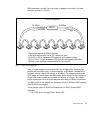
16 IBM Certification Study Guide AIX HACMP
2
a PCI Multiport Async Card is required in an S7X model, no native ports
3
only one serial port available for customer use, i.e. HACMP
In case the number of native serial ports doesn’t match your HACMP cluster
configuration needs, you can extend it by adding an eight-port asynchronous
adapter, thus reducing the number of available MCA slots, or the
corresponding PCI Multiport Async Card for PCI Machines, like the S7X
model.
Target-mode SCSI
Another possibility for a non-TCP/IP network is a target mode SCSI
connection. Whenever you make use of a shared SCSI device, you can also
use the SCSI bus for exchanging heartbeats.
Target Mode SCSI is only supported with SCSI-2 Differential or SCSI-2
Differential Fast/Wide devices. SCSI/SE or SCSI-2/SE are not supported for
HACMP serial networks.
The recommendation is to not use more than 4 target mode SCSI networks in
a cluster.
Target-mode SSA
If you are using shared SSA devices, target mode SSA is the third possibility
for a serial network within HACMP. In order to use target-mode SSA, you
must use the Enhanced RAID-5 Adapter (#6215 or #6219), since these are
the only current adapters that support the Multi-Initiator Feature. The
microcode level of the adapter must be 1801 or higher.
2.3 Cluster Disks
This section describes the various choices you have in selecting the type of
shared disks to use in your cluster.
2.3.1 SSA Disks
The following is a brief description of SSA and the basic rules to follow when
designing SSA networks. For a full description of SSA and its functionality,
please read
Monitoring and Managing IBM SSA Disk Subsystems,
SG24-5251.
SSA is a high-performance, serial interconnect technology used to connect
disk devices and host adapters. SSA is an open standard, and SSA
specifications have been approved by the SSA Industry Association and also
as an ANSI standard through the ANSI X3T10.1 subcommittee.


















